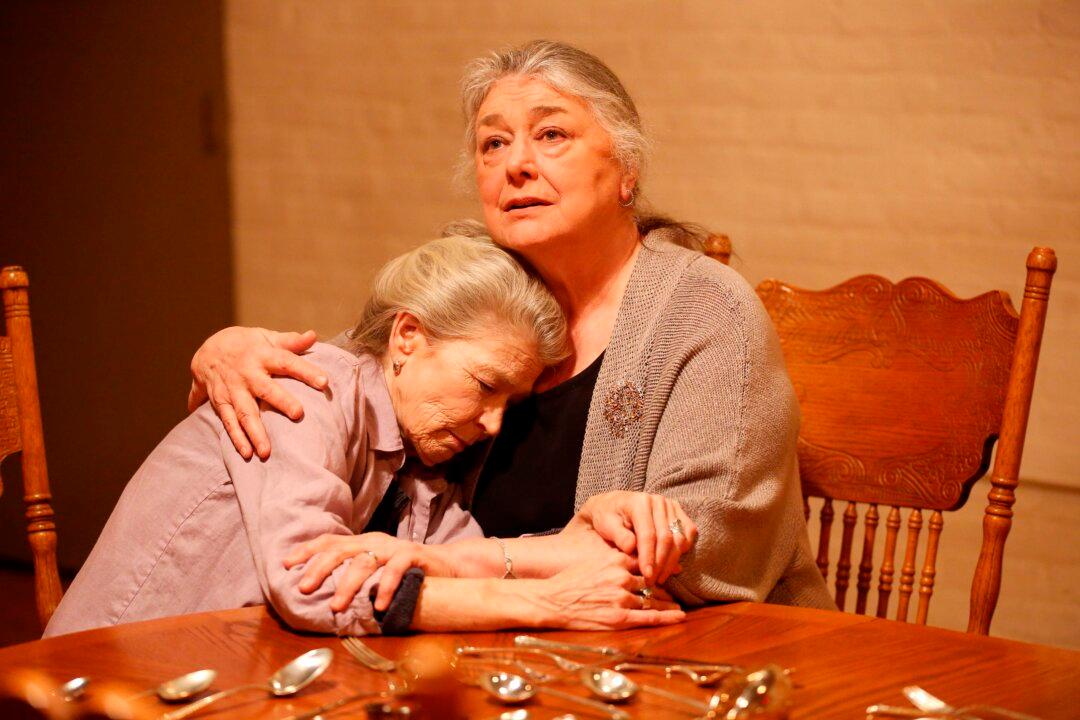NEW YORK—One enters the vast Gym at Judson where John Van Druten’s “I Remember Mama” is to take place. The space is filled with about 11 older, traditional dining tables and chairs. Each is loaded with varied articles of one type: One holds drinking glasses of various styles, another holds silverware, another books, photographs, one holds two typewriters. From this last-named table, the narrator of the story, Katrin (Barbara Barrie), begins relating the family saga.
The play, based on Kathryn Forbes’s novel “Mama’s Bank Account,” tells of a Norwegian family. Katrin’s parents were born in the Old Country; she and her siblings were born in San Francisco, where they make their home. The year is 1910.
The story reveals itself by small, on the surface, unimportant events: There is the weekly Saturday night counting out of cash by Mama (Barbara Andres) to cover expenses. There is rent to be paid, there is food, there are other necessary expenses.
If there isn’t enough cash for these, Katrin and sister Christine (Louise Sorel) volunteer to work after school to bring in more money for the family. But there never seems to be enough to buy Mama a warm coat.
Papa (Dale Soules) remains pretty much in the background. His earnings as a carpenter are just too meager to supply everything.
Dagmar (Phyllis Somerville) owns a cat, Elizabeth, who is renamed Uncle Elizabeth when it’s discovered by brother Nels (Heather MacRae), the only boy in the brood, that Elizabeth is a male.
There are two somewhat unpleasant aunts, Mama’s sisters, Jenny (Alice Cannon) and Sigrid (Susan Lehman), plus a third, Aunt Trina (Rita Gardner), who has a sweetness about her.
Trina approaches Mama with the remarkable information that she wants to get married, and the man in question, the undersized undertaker Mr. Thorkelson (Heather MacRae) is amenable. But he wants a dowry.
The scene between Thorkelson and head of the family, Uncle Chris (Lynn Cohen), is a classic, self-righteous power play in which Uncle Chris sets Thorkelson straight.
Uncle Chris’s aggressiveness is also expressed regarding a medical problem when his niece Dagmar must have a mastoid operation. He locks horns with Dr. Johnson (Dale Soules), and unexpectedly, the doctor wins the battle. Uncle Chris can’t always have his way.
An elegant gentleman boarder, Mr. Hyde (Lynn Cohen), is on hand. He reads poetry and classic fiction aloud to the family in the evenings. They adore him. When he later leaves this abode, paying by dubious check, Mama in effect shrugs. He has given them more than money; he has enriched them with culture and his donated library.
When Katrin is about to graduate high school, she desperately wants a magnificent dresser set of marvelous celluloid as her graduation gift. This incident is very meaningful, for its ultimate outcome teaches Katrin the importance of self-sacrifice when her desires and Mama’s, arguably for the first time, come in conflict with one another. This marks a big step in Katrin’s growth as a human being.
Later, the family gathers round Uncle Chris on his deathbed and meets for the first time “his woman” of 12 years, Jessie (Phyllis Somerville), whom he was prevented from marrying because she had a husband “somewhere.” The family, who had at first rejected Jessie, comes around to accepting her.
Katrin’s goal to become a writer is the center of her life. A sequence in which Mama persuades a prominent writer to read Katrin’s work exhibits the cleverness and persistence of the uneducated Norwegian woman.
Except for Andres and Barrie, all the actors double or triple in other roles. At times, to my mind, there was some lack of clarity in these multiple castings. But the overall effect is so enveloping and often moving that this is a mild shortcoming.
As for Barbara Andres’s performance as Mama, it is nothing short of extraordinary. She anchors the play in such a way that can only be described as unforgettable and keeps it from falling into the trap of sentimentality.
The entire cast, under direction of Jack Cummings III, artistic director of the Transport Group Theatre Company, supplies a richness of character portraits not often seen.
“I Remember Mama”
Transport Group Theatre Company
The Gym at Judson
243 Thompson Street
Running Time: 2 hours, 30 minutes
Tickets: 212-352-3101 or visit Transportgroup.org
Closes: April 20
Diana Barth publishes New Millennium, an arts publication. For information: [email protected]

Phyllis Somerville and Barbara Andres in a scene from “I Remember Mama.” Carol Rosegg
|Updated:
Diana Barth writes for various theatrical publications and for New Millennium. She may be contacted at [email protected]
Author’s Selected Articles




